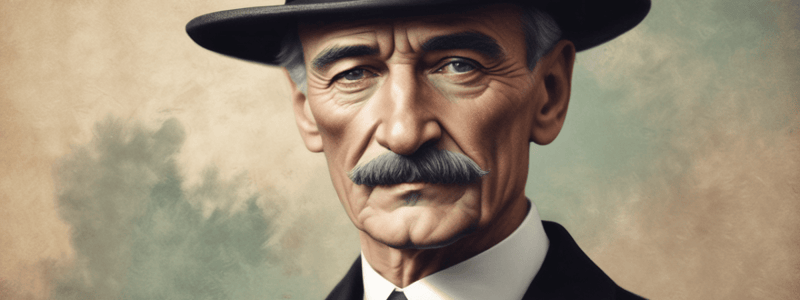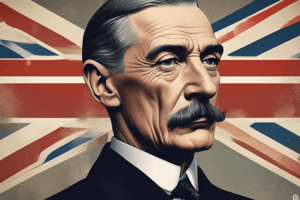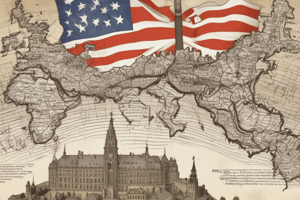Podcast
Questions and Answers
Who replaced Stanley Baldwin as prime minister in 1937?
Who replaced Stanley Baldwin as prime minister in 1937?
- Winston Churchill
- Lord Halifax
- Stanley Baldwin
- Neville Chamberlain (correct)
Chamberlain's premiership was marked by a period of economic downturn and rising unemployment.
Chamberlain's premiership was marked by a period of economic downturn and rising unemployment.
False (B)
What was the name given to the seven-month stand-off between the British Expeditionary Force and Germany during World War II?
What was the name given to the seven-month stand-off between the British Expeditionary Force and Germany during World War II?
The Phoney War
Who did Churchill include in his wartime cabinet?
Who did Churchill include in his wartime cabinet?
Why did the Labour Party refuse to serve under Chamberlain in May 1940?
Why did the Labour Party refuse to serve under Chamberlain in May 1940?
Match the following individuals with their roles:
Match the following individuals with their roles:
Chamberlain won the vote of no confidence in Parliament with a large majority.
Chamberlain won the vote of no confidence in Parliament with a large majority.
What percentage of the civilian population was involved in war work by 1944?
What percentage of the civilian population was involved in war work by 1944?
The Essential Work Order in 1941 allowed employers to dismiss workers easily.
The Essential Work Order in 1941 allowed employers to dismiss workers easily.
Who was the Minister of Labour during World War II?
Who was the Minister of Labour during World War II?
The _______ Act was used to allow semi-skilled workers to undertake formerly skilled jobs.
The _______ Act was used to allow semi-skilled workers to undertake formerly skilled jobs.
What was the purpose of the 'Worker's Playtime' radio programme?
What was the purpose of the 'Worker's Playtime' radio programme?
Wages decreased during World War II.
Wages decreased during World War II.
What was the result of the 1942 miners' strike in Kent?
What was the result of the 1942 miners' strike in Kent?
Match the following individuals with their roles:
Match the following individuals with their roles:
The Defence Regulation 58AA banned _______ and lockouts in 1940.
The Defence Regulation 58AA banned _______ and lockouts in 1940.
There were no strikes during World War II.
There were no strikes during World War II.
What was the main theme of Winston Churchill's first speech as prime minister to the House of Commons?
What was the main theme of Winston Churchill's first speech as prime minister to the House of Commons?
The British government took control of war production during the Second World War.
The British government took control of war production during the Second World War.
What was the significance of the Lend-Lease Agreement?
What was the significance of the Lend-Lease Agreement?
What was the main difference between the British wartime and peacetime economies?
What was the main difference between the British wartime and peacetime economies?
The British government maintained a managed economy after the war.
The British government maintained a managed economy after the war.
What was the impact of the Second World War on employment in Britain?
What was the impact of the Second World War on employment in Britain?
Match the following ministries with their responsibilities:
Match the following ministries with their responsibilities:
Between 1940 and 1944, Britain produced _______________ aircraft.
Between 1940 and 1944, Britain produced _______________ aircraft.
The USA was neutral during the Second World War.
The USA was neutral during the Second World War.
Study Notes
Chamberlain's Premiership, 1937-40
- Stanley Baldwin resigned in 1937 due to ill health, and Neville Chamberlain became prime minister.
- Chamberlain's premiership was marked by economic recovery, falling unemployment, and stable prices.
- The National Government faced the challenge of rearmament amidst growing anti-war sentiment in Britain.
- Chamberlain allowed concessions to Nazi Germany, leading to the 'Phoney War' in 1939.
- The British Expeditionary Force was mobilized to France, but the war effort was marked by inaction until April 1940.
- The Norway debate in Parliament led to Chamberlain's resignation, and Winston Churchill became prime minister.
Churchill's Premiership, 1940-45
- Churchill formed a coalition government with Labour and Liberal politicians.
- He made his famous "blood, toil, tears and sweat" speech to the House of Commons in May 1940.
- The German Army's sweep through France led to the British Expeditionary Force's withdrawal to Dunkirk.
- Churchill's cabinet debated whether to make peace with Germany, but Churchill argued against it.
- The government took control of war production, creating ministries for aircraft production, supply, war production, food, and labor.
- The managed economy was maintained by the post-war Labour government, which nationalized key industries.
Military Expenditure and Economic Aid
- Britain had significant military equipment shortages in 1939, but rearmament efforts increased production.
- The USA provided economic aid to Britain, despite being neutral, through the Lend-Lease Agreement and 'Liberty Ships'.
- The agreement allowed Britain to receive resources without immediate payment, with the bill to be paid after the war.
Changing Work Opportunities and Conditions, 1939-51
- The Second World War brought full employment and the deployment of women into factories and male-dominated jobs.
- By 1944, 33% of the civilian population was involved in war work, including 7 million women.
- Wages, benefits, and working conditions improved, and unions negotiated better deals.
- The Essential Work Order and Control of Employment Act were used to regulate employment and tie people to essential jobs.
Industrial Relations, 1939-45
- The relationship between trade unions and the government underwent a period of transition during the war.
- Unions and the government worked closely together, with the government recognizing the importance of unions in the war effort.
- Ernest Bevin, the Minister of Labour, had almost complete control over the workforce and fostered cooperation between workers and management.
- Skilled workers and union shop stewards became powerful during the war due to labor shortages and high demand for quality work.
Wartime Strikes
- Despite the popular view of social peace during the war, numerous strikes and protests occurred over wages and working conditions.
- The government introduced Defence Regulation 58AA banning strikes and lockouts in 1940.
- Miners went on strike in 1942, leading to the government taking over the coal industry and improving wages.
- Strikes continued throughout the war, with 514 strikes occurring in the south Wales coal fields between 1939 and 1944.
Studying That Suits You
Use AI to generate personalized quizzes and flashcards to suit your learning preferences.
Description
Learn about Neville Chamberlain's premiership, from economic recovery to the looming threat of war during a period of international instability.




